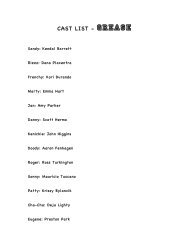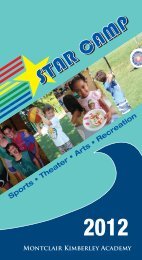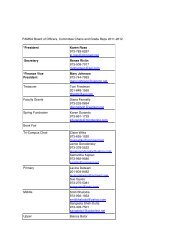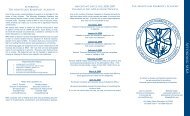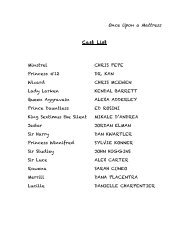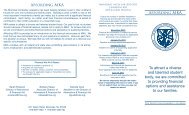Foreign Language at MKA - Montclair Kimberley Academy
Foreign Language at MKA - Montclair Kimberley Academy
Foreign Language at MKA - Montclair Kimberley Academy
- No tags were found...
Create successful ePaper yourself
Turn your PDF publications into a flip-book with our unique Google optimized e-Paper software.
Spanish is an accessible language to for most students. Muchof its vocabulary is similar to English, and written Spanish isalmost completely phonetic. It helps to have a good understandingof grammar and to be detail oriented (to rememberaccents, irregular verbs, etc.) but it is equally important to bediligent in studying a little every day in order to develop andbuild your skills. Learning a modern foreign language is askill like riding a bike – you must be willing to learn physicallythrough speaking, writing, listening and reading.Why Chinese?Chinese, in one form or another, is spoken by more than aquarter of the world’s popul<strong>at</strong>ion. It is also one of the oldestlanguages in the world, and the oldest one still in use today.Studying Chinese provides an understanding of a very ancientculture and a distinctive way of thinking. It can also help prepareyou for a world and a job market where economic connectionsbetween East and West are increasingly important.No western language is similar to Chinese. The close rel<strong>at</strong>ionshipbetween a word and its written represent<strong>at</strong>ion doesn’texist in any Romance language. When you see 木 (tree), youcan understand 林 (woods), and then 森 (forest). The characterfor good, 好 ,made out of a woman and a child nextto each other, tells us a lot about the historic importance offamily in China. If you are thinking of taking up Chinese,you need to be aware th<strong>at</strong> its reput<strong>at</strong>ion for being a difficultlanguage is partially true, but if you have the motiv<strong>at</strong>ion todo well, studying Chinese can be a wonderful and rewardingexperience. You will need a very good memory, sharpobserv<strong>at</strong>ion skills to differenti<strong>at</strong>e apparently similar characterssuch as 八 , 入 and 人 , a musical ear to be able to recognizethe tones of Chinese, and an ability to reproduce thesetones. The tones make learning Chinese both challengingand interesting. The four characters 妈 , 麻 , 马 , 骂 are allpronounced ma, but with a different tone each (respectively,mā, má, mǎ and mà).Linguistic challenge, a deep sense of history and unlimitedopportunity for use are all part of the mastery of Chinese.Why L<strong>at</strong>in?L<strong>at</strong>in has given me a set of skills and insights th<strong>at</strong> cannot comefrom any other language. Once you have taken L<strong>at</strong>in, youcan deal with anything any modern European language canthrow <strong>at</strong> you. Not only is L<strong>at</strong>in <strong>at</strong> the base of all these languages,but it also contains all of their major structures. Whenyou study the speeches of Cicero, or the poetry of Virgil, youlearn tricks of prose and poetry th<strong>at</strong> were used by the best writersof the day, and th<strong>at</strong> extra polish goes a long way in writingthe kind of advanced papers college professors will demand.Sam Bieler ‘08, University of Pennsylvania ‘12Learn the language of the Romans th<strong>at</strong> evolved into Spanish,French, Italian and Portuguese! Did you know th<strong>at</strong> almost allthe planets and their moons are named after Greco-Romanmythological figures? Over 50% of English words are derivedfrom L<strong>at</strong>in, and understanding L<strong>at</strong>in can provide valuableinsights into the meaning of more complex English words. Inaddition to leaving us a legacy of gre<strong>at</strong> liter<strong>at</strong>ure and art, theRomans cre<strong>at</strong>ed cement, roads, aqueducts, our calendar andmany other inventions th<strong>at</strong> are still used today. L<strong>at</strong>in is theprecise and beautiful language of many of the past’s gre<strong>at</strong> artists,architects, authors, scholars and st<strong>at</strong>esmen.The study of L<strong>at</strong>in involves learning lots of forms since theform of a word differs depending on how it is functioning ina sentence. Therefore, good memoriz<strong>at</strong>ion skills are helpful.However, learning L<strong>at</strong>in also involves <strong>at</strong>tention to detail;for example, there is a difference in function between a wordth<strong>at</strong> ends in -a and a word th<strong>at</strong> ends inā. Studying L<strong>at</strong>in alsofirms up knowledge of grammar, so if you like grammar oryour grammar skills could use some strengthening, L<strong>at</strong>in canbe very rewarding. Determining how each word fits togetherto make up a L<strong>at</strong>in sentence requires critical thinking and alsoa bit of “detective work.” If you like puzzles and hunting forclues to help you figure out the solution to a puzzle, thenL<strong>at</strong>in may be just the language for you!For more detailed inform<strong>at</strong>ion on specific coursecontent and levels offered, please refer to the CampusCurriculum Guides available on the <strong>MKA</strong> website <strong>at</strong>www.mka.org.Amigable • 友 好 • Amical • Rem Praestare • Responsable • 责Responsable • Confidens • Seguro • 自 信 • Confiant • Temper• Mesurado • 温 和 • Modéré • Iustus • Justo • 公 正 • Juste •tus • Bien informado • 灵 通 • Informé • Sincerus • Honesto •实 • Honnête • Verecundus • Respetuoso • 恭 敬 • RespectueuBenevolus • Amigable • 友 好 • Amical • Rem Praestare • Respsable • 责 任 • Responsable • Confidens • Seguro • 自 信 • Co• Temperans • Mesurado • 温 和 • Modéré • Iustus • Justo • 公Juste • Doctus • Bien informado • 灵 通 • Informé • Sincerus •nesto • 诚 实 • Honnête • Verecundus • Respetuoso • 恭 敬 • Rspectueux • Benevolus • Amigable • 友 好 • Amical • Rem Pra• Responsable • 责 任 • Responsable • Confidens • Seguro • 自Confiant • Temperans • Mesurado • 温 和 • Modéré • Iustus •• 公 正 • Juste • Doctus • Bien informado • 灵 通 • Informé •rus • Honesto<strong>Foreign</strong>• 诚 实 • Honnête • Verecundus • Respetuoso •• Respectueux • Benevolus • Amigable • 友 好 • Amical • Remstare • Responsable • 责 任 • Responsable • Confidens • Segur信 • Confiant • Temperans • Mesurado • 温 和 • Modéré • IusJusto •<strong>Language</strong>公 正 • Juste • Doctus • Bien informado • 灵 通 • InformSincerus • Honesto • 诚 实 • Honnête • Verecundus • Respetuo恭 敬 • Respectueux • Benevolus • Amigable • 友 好 • Amical •Praestare • Responsable • 责 任 • Responsable • Confidens • S• 自 信 • Confiant<strong>at</strong>• Temperans<strong>MKA</strong>• Mesurado • 温 和 • Modéré •tus • Justo • 公 正 • Juste • Doctus • Bien informado • 灵 通 •mé • Sincerus • Honesto • 诚 实 • Honnête • Verecundus • Reoso • 恭 敬 • Respectueux • Benevolus • Amigable • 友 好 • A• Rem Praestare • Responsable • 责 任 • Responsable • ConfidSeguro • 自 信 • Confiant • Temperans • Mesurado • 温 和 • M• Iustus • Justo • 公 正 • Juste • Doctus • Bien informado • 灵• Informé • Sincerus • Honesto • 诚 实 • Honnête • VerecunduRespetuoso • 恭 敬 • Respectueux • Benevolus • Amigable • 友Amical • Rem Praestare • Responsable • 责 任 • Responsable •fidens • Seguro • 自 信 • Confiant • Temperans • Mesurado •• Modéré • Iustus • Justo • 公 正 • Juste • Doctus • Bien infor• 灵 通 • Informé • Sincerus • Honesto • 诚 实 • Honnête • Vedus • Respetuoso • 恭 敬 • Respectueux • Benevolus • Amigab友 好 • Amical • Rem Praestare • Responsable • 责 任 • Respon• Confidens • Seguro • 自 信 • Confiant • Temperans • Mesura温 和 The • Modéré <strong>Montclair</strong> • Iustus • Justo <strong>Kimberley</strong> • 公 正 • Juste <strong>Academy</strong>• Doctus • Bienformado • 灵 通 • Informé • Sincerus • Honesto • 诚 实 • Hon• Verecundus • Respetuoso • 恭 敬 • Respectueux • BenevolusAmigable • 友 好 • Amical • Rem Praestare • Responsable • 责Responsable • Confidens • Seguro • 自 信 • Confiant • Temper• Mesurado • 温 和 • Modéré • Iustus • Justo • 公 正 • Juste •
“To have another language is to possess a second soul” - Charlemagne<strong>Language</strong> Study At MkaIn accordance with its mission to “Engage each student intellectuallyand personally with the world,” The <strong>Montclair</strong> <strong>Kimberley</strong><strong>Academy</strong> provides a rich and cohesive world language programth<strong>at</strong> incorpor<strong>at</strong>es a range of opportunities from Pre-K – 12thgrade. Exposure to another language cre<strong>at</strong>es students who aremore informed and culturally aware of the world around them.All students begin language study when they enter <strong>MKA</strong>, and areencouraged to study French, Spanish, Chinese or L<strong>at</strong>in for fourconsecutive years <strong>at</strong> the Upper School.We teach our students th<strong>at</strong> learning language is practical andpurposeful because they can have immedi<strong>at</strong>e access to millionsmore people simply by speaking a second language. Our studentsstudy current events in the target language; they read newspaperarticles and write their own; they use podcasts to simul<strong>at</strong>e authenticconvers<strong>at</strong>ions; they do research on the history and culture ofthe countries where the language is spoken; they cre<strong>at</strong>e pamphletsth<strong>at</strong> defend a cause, and through technology; they converse withn<strong>at</strong>ive speakers. Our students learn to write formal and informalletters; they write and perform interviews with famous n<strong>at</strong>ivespeakers; and they study liter<strong>at</strong>ure and movies th<strong>at</strong> give them insightinto the culture and traditions of the target language countries.When they find themselves face to face with someone whodoesn’t speak English, they can communic<strong>at</strong>e. Tracy Kuser, UpperSchool <strong>Foreign</strong> <strong>Language</strong> Teacher<strong>MKA</strong> has a tradition of excellence in the teaching of foreignlanguages, and students have the opportunity to enter n<strong>at</strong>ionallanguage exams and excel in Advanced Placements courses andSAT subject tests. With <strong>MKA</strong>’s 1:1 laptop learning environment,students essentially have access to personal language labs. Emphasison fluency as well as reading, writing and aural comprehensionproduces students who can communic<strong>at</strong>e effectivelyand are able to take full advantage of the variety of foreign tripsoffered by the school. In addition, many students find th<strong>at</strong> their<strong>MKA</strong> courses fulfill freshman college language requirements, andgo on to study languages <strong>at</strong> the highest levels. Some <strong>MKA</strong> gradu<strong>at</strong>eshave used their prepar<strong>at</strong>ion as a found<strong>at</strong>ion to pursue newlanguages as complex as Russian, Korean and Hindi.At <strong>MKA</strong>, French, Spanish, Chinese and L<strong>at</strong>in are offered <strong>at</strong> variousgrades and <strong>at</strong> various levels:At the Primary School:Starting in Pre-Kindergarten, French and Spanish are offered inaltern<strong>at</strong>ing years. Students beginning French or Spanish in Pre-Kwill study th<strong>at</strong> language for five years <strong>at</strong> the Brookside campus.Children who enter <strong>at</strong> a l<strong>at</strong>er grade will join the language th<strong>at</strong>his/her peers began in Pre-K. Pre-K students entering in September2010 will study Spanish. Pre-K students entering in September2011 will study French. Students leave Brookside with a lovefor language study, an “ear” for the language, significant vocabularyexposure and the found<strong>at</strong>ions of an authentic accent, readyto develop further skills in a language of their choice.There are four choice points where students may elect to beginthe study of a new language:At the Middle School:All incoming 4th - 6th grade students, regardless of the languagethey may have studied in their elementary school years, have theoption to choose to study either French or Spanish. Because languageselection <strong>at</strong> Brookside is determined by year of entry, thisprovides a gre<strong>at</strong> opportunity to try something new, and experiencehas shown th<strong>at</strong> students flourish when transferring from oneRomance language to another.In seventh grade, students new to <strong>MKA</strong> can choose betweenentry level French, Spanish, Chinese or L<strong>at</strong>in or may place into ahigher-level French or Spanish class if they have prior experiencein those languages. Current <strong>MKA</strong> students are encouraged to remainin the language they have been studying in order to ensurecompletion of the full language sequence to AP level however,they may switch to an entry level L<strong>at</strong>in or Chinese course.At the Upper School:All students entering 9th grade have the option to study French,Spanish, Chinese or L<strong>at</strong>in. Students who are new to <strong>MKA</strong> cantake a placement test if they have prior experience with a languageand are interested in moving directly beyond Level 1. Forthose who are particularly facile with foreign languages and areable to balance an increased workload, there may be the optionto “double up” and study two languages during an academic year.The majority of students take a language through level four intheir junior year, and many continue to level five, honors or APoptions for senior year.How Do You ChooseA <strong>Language</strong>?Why French?Everyone asked me why I chose French, pointing out th<strong>at</strong>Spanish was becoming more and more practical, or telling mehow useful L<strong>at</strong>in would be for the upcoming SATs, to which Ireplied, “Yes, I know… but French is just so beautiful.” Luckily,I can now say th<strong>at</strong> learning French has turned out to be a farmore practical decision than I ever would have imagined. Littledid I know th<strong>at</strong> my French 1 course freshman year <strong>at</strong> <strong>MKA</strong>would lead to a French minor <strong>at</strong> Duke University, let alone mycurrent gradu<strong>at</strong>e studies here in Paris. Mara Herrmann ‘05Be understood in 55 countries across 5 continents by over200 million people! Did you know th<strong>at</strong> over 50% of Englishwords come directly from French? French is the 2nd mostinfluential language in the worlds of diplomacy, science andbusiness. It is the 2nd language of the European Union – thelargest economic power in the world, and is the 2nd languageof the Internet. In addition, France is the 5th largest economicpower in the world, and approxim<strong>at</strong>ely 500,000 workers inthe USA are employed by French companies.French is an accessible language th<strong>at</strong> shares the same alphabetand even some of the same words as English. While anability to spell correctly and an understanding of grammarwill help you master French, the ability to pronounce wordsth<strong>at</strong> may not necessarily look like wh<strong>at</strong> they sound like is askill th<strong>at</strong> you can develop over time. As with learning mostforeign languages, starting out with a confident and uninhibited<strong>at</strong>titude is important - practice really does make perfect!Why Spanish?Simply put the “magic” of studying Spanish is its usefulness.There are 500 million speakers in the world and Spanish isan official language on four continents. There are more n<strong>at</strong>ivespeakers of Spanish than English worldwide, and in theUnited St<strong>at</strong>es, there are over 30 million n<strong>at</strong>ive Spanish speakers–a number th<strong>at</strong> continues to grow rapidly. There has beena cultural explosion of Spanish liter<strong>at</strong>ure, art, music and filmin recent years, and finally, being able to speak Spanish makesyou marketable from a career standpoint, as Spanish speakersconstitute a huge and rapidly growing worldwide market - predictedto be one of the most important markets of the future.(Continued on the other side)








